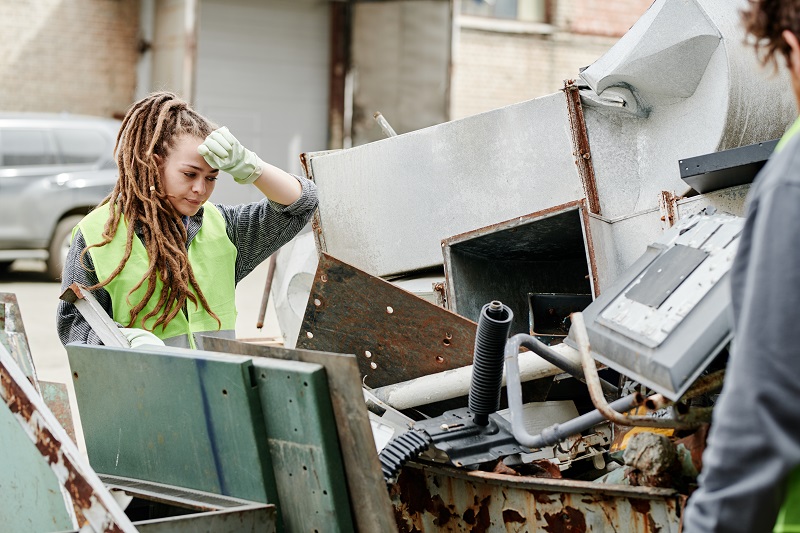Home renovations are an exciting opportunity to transform your space, but without careful planning, they can easily lead to frustration, delays — and mountains of unexpected waste. Every extra trip to the landfill or pile of wasted materials not only costs you more but also takes a toll on the environment. At Infinite Disposal, we’ve seen it all. From kitchen remodels to full home gut jobs across Colorado Springs, we know that the most successful renovation projects are the ones that plan for waste management right from the start. In this guide, we’ll break down the top 10 renovation mistakes that create excess waste and show you simple, practical ways to avoid them — saving you time, money, and stress along the way.
1. Poor Planning from the Start
One of the biggest reasons renovation projects produce unnecessary waste is lack of planning. When homeowners dive into a renovation without a clear, structured plan, mistakes happen — and so does waste. For example, realizing halfway through a project that a wall placement needs to change can mean tearing out perfectly good drywall and lumber. Overordering materials without knowing exact measurements leads to piles of leftovers that can’t always be returned.
How to Avoid It:
Spend time developing a detailed renovation plan. Work with licensed contractors who can help you anticipate potential issues. Budget for a little extra material, but not double or triple what’s needed. Think through every stage: demolition, installation, and finishing touches. A thoughtful plan minimizes surprises — and the waste that comes with them.
2. Underestimating the Amount of Debris
Many homeowners are surprised by just how much waste even small renovations generate. Replacing kitchen cabinets? That’s old cabinets, drywall, tile, flooring, and more. Even a modest bathroom update can fill up your regular trash bins fast. When the waste piles up, panic sets in — and expensive, last-minute junk removal services become the only option.
How to Avoid It:
Estimate debris ahead of time. Consult with your contractor or a local dumpster rental company like Infinite Disposal. Book a roll-off dumpster early. Choose the right size based on your project scope. Plan for the unexpected. It’s better to have a little extra dumpster space than not enough.
3. Choosing the Wrong Materials
Choosing cheap, trendy, or unsuitable materials might save money upfront, but often leads to early replacements and more waste down the line. For example, bargain flooring might wear out or warp quickly, forcing you to rip it out and start over.
How to Avoid It:
Prioritize quality and durability. Focus on materials that will last, even if they cost slightly more. Consider environmental impact. Look for sustainably sourced wood, recycled countertops, and other green options. Work with reputable suppliers. They can recommend materials suitable for your climate and lifestyle. Making smarter material choices not only reduces waste today but ensures your renovation stands the test of time.
4. Ignoring Material Measurements
It sounds basic, but it happens all the time: measuring once instead of twice. The result? Excess tile, flooring, trim, countertops — and a trash bin full of wasted products. Inaccurate measurements can also delay projects, forcing you to reorder supplies and extend your renovation timeline.
How to Avoid It:
Measure twice, order once. Double-check all measurements before placing any orders. Use calculators from manufacturers. Many flooring and tile companies offer online tools. Factor in waste percentages wisely. Some overage (usually 5-10%) is necessary for cuts and mistakes, but don’t overdo it. A little precision now saves big piles of waste later.
5. Failing to Deconstruct Instead of Demolish
Demo day feels satisfying — smashing cabinets, pulling down walls — but full-force demolition leads to far more waste than necessary. Many old cabinets, doors, fixtures, and flooring can be reused, repurposed, or donated.
How to Avoid It:
Deconstruct carefully. Remove items with an eye toward reuse. Donate usable materials. Organizations like Habitat for Humanity’s ReStore accept gently used building supplies. Resell valuable items. Appliances, vintage doors, and hardwood flooring often have resale value. Conscious deconstruction reduces landfill impact — and might even put a little cash back in your pocket.
6. Not Recycling Where Possible
During renovations, it’s easy to treat everything like trash — but in reality, many building materials can (and should) be recycled. Wood scraps, drywall, cardboard packaging, metal fixtures, and even concrete can often be diverted from the landfill.
How to Avoid It:
Separate recyclable materials as you go. Set up clear sorting areas on your job site. Work with eco-friendly partners. Companies like Infinite Disposal can advise on recycling options for construction debris. Ask about local recycling centers. Many accept items like scrap metal, asphalt, and clean wood. A little effort in sorting goes a long way toward a greener renovation.
7. Improper Storage of Materials
Nothing’s worse than buying expensive flooring, only to find it warped after sitting exposed to rain for a week. Improper storage leads to ruined materials — and unnecessary waste.
How to Avoid It:
Store materials indoors when possible. Keep items in a garage or covered area. Protect against weather. Use tarps and moisture barriers if materials must be stored outside. Handle with care. Minimize drops, cracks, and tears during unloading and moving. Protecting your materials means less waste, fewer delays, and lower overall project costs.
8. Ordering Too Much Inventory
Homeowners often order more material than they need “just in case.” While it’s smart to have a small buffer, ordering way too much guarantees leftovers that often end up in the dumpster.
How to Avoid It:
Work with suppliers who allow returns. Some businesses will take back unopened boxes of flooring or tile. Trust your measurements and budgeted overage. Avoid fear-based overbuying. Communicate clearly with contractors. Ensure everyone is on the same page regarding material quantities. Controlled ordering helps keep your project efficient — and your cleanup manageable.
9. Skipping Permits and Inspections
Skipping necessary permits might save time upfront, but it’s a shortcut that can cause major headaches later. If city inspectors find unpermitted work, you may be forced to tear out completed sections — resulting in double the labor, double the cost, and double the waste.
How to Avoid It:
Always check with your local building department. Find out what permits you need before starting any project. Hire licensed contractors. Professionals understand code requirements and can handle permitting for you. Schedule required inspections. Don’t skip this critical step. Doing things the right way from the beginning ensures your project stays on track — and avoids unnecessary rework.
10. Waiting Until the Last Minute to Arrange Waste Removal
Many homeowners assume their weekly curbside trash pickup will be enough — until they realize they have piles of debris sitting in the driveway, creating an eyesore (and possibly violating HOA rules). When you’re already knee-deep in your project, scrambling for a solution just adds stress.
How to Avoid It:
Book a dumpster rental early. Contact Infinite Disposal before your project starts. Choose the right size. Our team can help you estimate based on the type and scale of your renovation. Plan your pickup schedule. Arrange for emptying and swapping dumpsters as needed to keep your site clean. Thinking ahead about waste management will make your entire renovation smoother — and way less stressful.
Why Waste Management Should Be Part of Every Renovation Plan
Managing waste efficiently during a renovation is about more than just convenience. It impacts your budget, your timeline, and your environmental footprint. At Infinite Disposal, we specialize in providing easy, affordable roll-off dumpster rentals for homeowners across Colorado Springs, Monument, Fountain, and surrounding areas. We know that having the right dumpster, placed at the right time, can make or break a home improvement project. Our roll-off containers are perfect for kitchen and bathroom remodels, whole-home renovations, roofing replacements, landscaping overhauls, and garage and basement cleanouts. We’ll work with you to ensure you get the right size dumpster — and we offer flexible pickup options to fit your project’s needs.
Simplify Your Renovation Cleanup with Infinite Disposal
Planning a home renovation in Colorado Springs? Don’t let waste slow you down. At Infinite Disposal, we make it easy to keep your project clean, organized, and running smoothly. With local expertise, affordable pricing, and a commitment to reliable service, we’re your trusted partner for residential trash service, commercial trash service, and dumpster rentals. Contact us today to schedule your roll-off dumpster delivery and experience the Infinite Disposal difference!


0 Comments